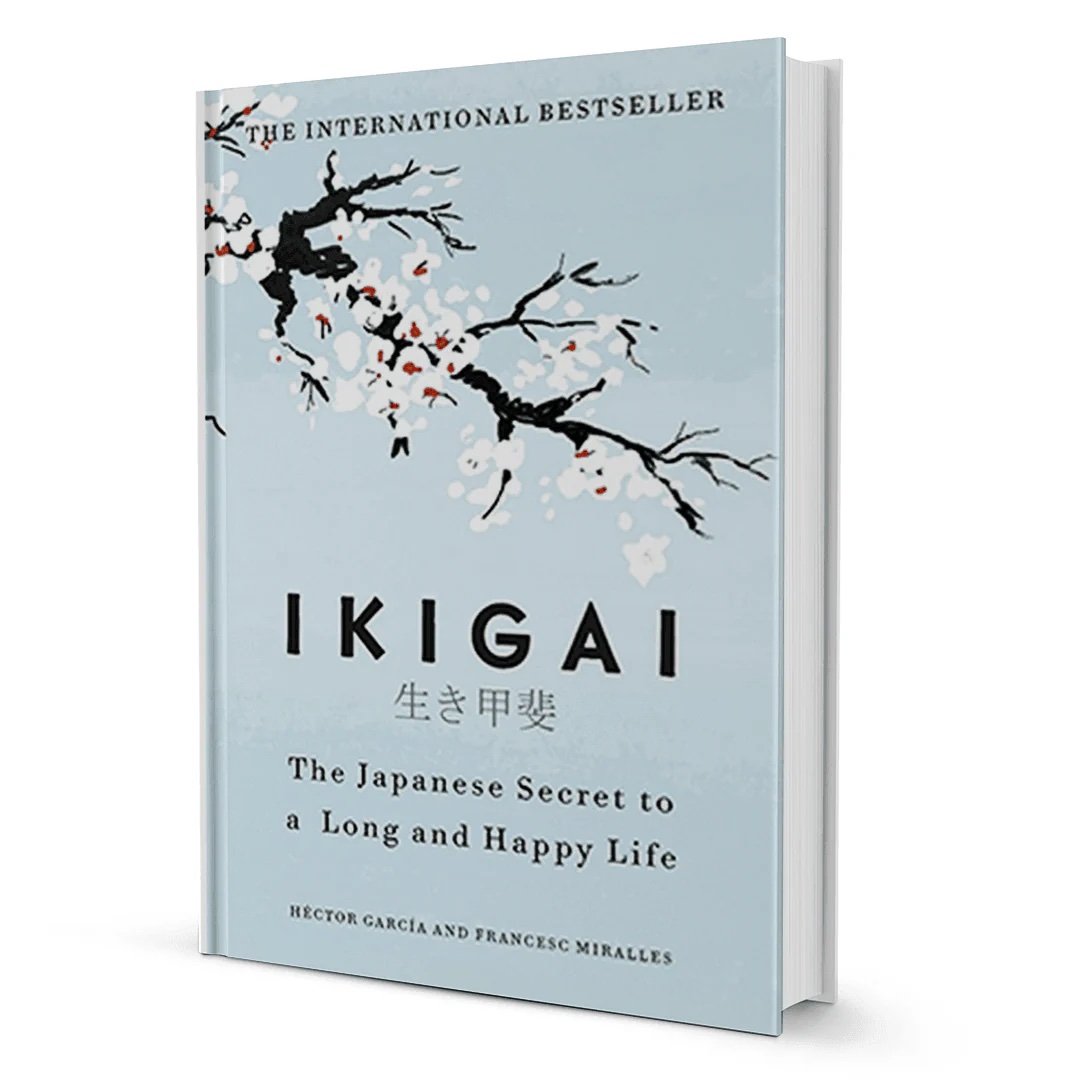Ikigai: The Japanese Secret
Ikigai: The Japanese Secret to a Long and Happy Life by Héctor García Puigcerver and Francesc Miralles explores the Japanese concept of ikigai, which loosely translates to “a reason for being” or “a reason to wake up in the morning.” This book delves into the wisdom of Okinawa, Japan, a place known for its high concentration of centenarians, to uncover the secrets to a long, fulfilling, and happy life. This is an amazing book, short enough to be read rapidly, but with such precious substance that i strongly recommend you to have it on your bookshelf.
Here’s a detailed summary of the key concepts and ideas presented in Ikigai:
1. Understanding Ikigai: The Essence of a Fulfilled Life
Core Idea:
At its heart, ikigai is about finding purpose and meaning in life. It’s the intersection where your passions, talents, and the things the world needs come together. The authors explain that everyone has an ikigai, though it might not always be easy to uncover. It’s the driving force behind a fulfilling life and the key to longevity and happiness.
Key Points:
- Four Pillars of Ikigai: The concept of ikigai can be understood through four intersecting elements:
- What You Love (Passion): The things you enjoy doing that bring you joy.
- What You Are Good At (Vocation): Your talents and skills.
- What the World Needs (Mission): How you can contribute to the world.
- What You Can Be Paid For (Profession): Activities that can earn you a living.
- Finding Balance:
True ikigai lies at the intersection of these four pillars, where passion, mission, vocation, and profession overlap. This balance is what sustains people throughout their lives, giving them a sense of purpose and direction.
Application:
To discover your ikigai, reflect on these four pillars. Identify what you love, where your skills lie, how you can contribute to society, and what you can be compensated for. This introspection will help you uncover your reason for being.
2. The Longevity of Okinawa: The Role of Community and Simplicity
Core Idea:
The authors explore Okinawa, often referred to as the “Land of Immortals,” to understand how its residents live long and healthy lives. They attribute the residents’ longevity to their strong sense of community, active lifestyle, simple diet, and deep sense of ikigai.
Key Points:
- Sense of Community:
In Okinawa, a strong sense of community plays a crucial role in the well-being of its residents. The concept of moai—a lifelong group of friends who support each other socially and financially—ensures that everyone has a strong social network. This connection provides emotional security and reduces stress, contributing to the residents’ long lives. - Healthy Diet:
The Okinawan diet is simple, focusing on natural, minimally processed foods. Their meals are rich in vegetables, tofu, sweet potatoes, and fish, and they follow the principle of hara hachi bu, which means eating until they are 80% full. This practice helps them avoid overeating and maintain a healthy weight. - Active Lifestyle:
Okinawans maintain a physically active lifestyle well into their later years. Regular physical activity, whether through gardening, walking, or traditional exercises like tai chi, is part of their daily routine, contributing to their longevity and physical health. - Low-Stress Living:
The Okinawan approach to life is also low-stress. The emphasis on living in harmony with others, maintaining a positive attitude, and enjoying the present moment plays a crucial role in their mental and emotional well-being.
Application:
To incorporate these principles into your own life, focus on building strong social connections, adopting a simple and healthy diet, staying physically active, and cultivating a positive, low-stress approach to life.
3. The Art of Staying Active: Never Retiring
Core Idea:
One of the most important aspects of ikigai is staying active and engaged throughout life. The concept of retirement, as it is understood in the West, doesn’t exist in Okinawa. Instead, the elders continue to work on what they love, contributing to their community and staying mentally and physically active.
Key Points:
- Continuous Engagement:
Okinawans believe that retiring from work also means retiring from purpose. They continue to pursue activities they enjoy and that bring value to their lives and communities, whether it’s farming, crafting, teaching, or any other passion. - Mental Sharpness:
Engaging in work and hobbies keeps their minds sharp and reduces the risk of age-related cognitive decline. Mental stimulation, combined with a purpose-driven life, plays a key role in maintaining cognitive health. - Purpose Beyond Profit:
The focus is not on earning money but on staying engaged in meaningful activities. Whether through volunteer work, helping others, or pursuing creative passions, staying busy with a purpose is essential for a fulfilling life.
Application:
Consider what activities or passions you can continue to engage in throughout your life. Find ways to contribute to your community or explore new hobbies that keep you mentally and physically active.
4. Finding Your Flow: The State of Being Fully Immersed
Core Idea:
Flow is a concept introduced by psychologist Mihaly Csikszentmihalyi, referring to the state of being fully immersed in an activity that you enjoy and excel at. The authors discuss how ikigai often involves activities that put you in a state of flow, where you lose track of time and are fully engaged in the moment.
Key Points:
- Characteristics of Flow: Flow occurs when you are doing something challenging but within your skill level, leading to deep focus and enjoyment. This state of flow is often a key component of ikigai.
- Finding Activities That Induce Flow: These activities are often linked to one’s ikigai. They provide a sense of purpose and fulfillment because they are inherently rewarding, not because of external rewards like money or recognition.
- Impact on Happiness: Regularly engaging in activities that induce flow contributes significantly to overall happiness and life satisfaction. It’s not just about being busy, but about being engaged in meaningful and enjoyable activities.
Application:
Identify activities that put you in a state of flow. Incorporate them into your daily life as much as possible. This could be a hobby, a creative pursuit, or work that challenges and fulfills you.
5. Resilience and Wabi-Sabi: Embracing Imperfection and Change
Core Idea:
The Japanese concept of wabi-sabi, which appreciates the beauty in imperfection and impermanence, is closely related to ikigai. Embracing the transient nature of life and finding beauty in the imperfect helps cultivate resilience, which is essential for a happy and fulfilling life.
Key Points:
- Embracing Imperfection:
Wabi-sabi teaches us to accept the imperfections in ourselves, others, and the world around us. This acceptance reduces the stress and dissatisfaction that come from striving for unattainable perfection. - Resilience Through Change:
Life is constantly changing, and resilience is the ability to adapt and thrive in the face of these changes. By embracing impermanence, we can develop the flexibility and strength needed to navigate life’s challenges. - Living in the Present:
Wabi-sabi encourages a focus on the present moment, appreciating the fleeting beauty of life and finding contentment in the here and now. This mindset is a key component of ikigai, helping people find joy and meaning in their daily lives.
Application:
Practice wabi-sabi by embracing the imperfections in your life and recognizing the beauty in the present moment. Develop resilience by accepting change and focusing on what you can control.
Discovering Your Ikigai
Ikigai: The Japanese Secret to a Long and Happy Life offers valuable insights into living a purposeful, healthy, and fulfilling life. By understanding and applying the principles of ikigai, you can find your own reason for being and cultivate a life filled with joy, health, and longevity. Whether through fostering strong social connections, staying active, finding your flow, or embracing imperfection, ikigai provides a powerful framework for living well.
Final Thoughts:
- Start Small:
Begin your journey to discovering your ikigai by reflecting on what you love, what you’re good at, what the world needs, and what you can be paid for. - Embrace the Journey:
Ikigai is not about a final destination but about enjoying the process of living a meaningful life. - Live with Purpose:
Each day is an opportunity to align your life with your ikigai, creating a life that is rich in purpose, fulfillment, and happiness.
By integrating the lessons from Ikigai, you can create a life of deep meaning and satisfaction, one that not only leads to personal happiness but also contributes to the well-being of others.









Comments